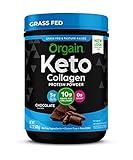Table of Contents
Keto diets are taking the world of nutrition by the storm.
Since its discovery as a treatment for epileptic patients, its use has far expanded down the years. Although keto diets provide so many health benefits, they are peculiar for weight loss.
Who would have thought of using keto to build muscles? Well, maybe anyone today but certainly not Dr. Russel Wilder when he discovered keto diet in 1921
So, can you build muscle on a keto diet?
We would answer that question and provide medical proofs to support our claims. More so, we wouldn’t stop there; we will also show you how to build muscle on a keto diet.
As a bonus, we will provide you recipes of three keto building meals you can make at home.
What is a Keto Diet?
Ketogenic, or keto diet is a very low carb, and high fat diet people undergo to get the body into a process called ketosis. Ketosis occurs when your body is low in glucose or carb, and it starts to use fats in the body to fuel the brain and muscles.
The body does not burn these fats directly but converts them into ketones while, in turn, powers the body’s operation.
As simple as that sounds, your body does not get into ketosis immediately when it is low in carbs. Precisely, starting a keto diet will trigger a few changes in your body system and how it functions. There are a few common signs of ketosis you’d experience even before switching into full ketosis
More so, it generally takes up to two to four days to enter ketosis even if your daily carb intake is less than 50grams.
Can you build muscle on a keto?

Simple answer,
Yes !
It is possible to build muscle on a ketogenic diet, and there is medical research that supports it. However, it is not as it sounds. Going on a keto diet will not make you develop muscles just like that. Like with the former norm of eating carbs to build muscles, you still will have to work out to burn fats and gain muscle.
Still, the good part about eating keto diets while on a workout is that it will help you burn fats faster. 
Sadly, you will experience a decrease in performance at the inception of your workouts. This reduction in performance is only your body trying to adapt to its new fuel source. Over time, you will have your focus and performance heightened.
Keto diets also link to an increase in strength and performance.
In a study to instigate the impact of keto diets on changes in body composition, 25 college-aged men were put on keto diets for ten weeks and strength training programs afterward.
Its result indicated that keto diets are suitable in combination with resistant training to trigger favourable changes in the body composition, hormonal profiles, and performance in resistant-trained males
In a more recent study, researchers investigated the effects of a keto diet on body composition and strength in trained women.
As with the result for trained males, the findings of this study indicate that keto diets can help to decrease fat mass and maintain fat-free mass after eight weeks.
However, its ability to increase fat-free mass is suboptimal.
In summary, you can build muscle on a keto diet, like you would on the typical high-carb diet familiar with muscle building.
So, how do you do that? We’d explain it to you now.
How can you build muscle on a keto diet?
There are few things to consider to build muscles while on a keto diet efficiently. Namely:
 Increase your calorie intake
Increase your calorie intake
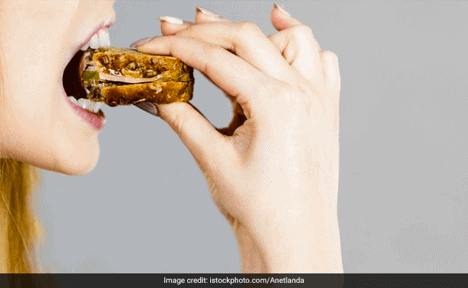
If you’re going to build muscles on a keto diet, you have to consume more calories than you will burn when working out. Precisely, keto gain requires a caloric surplus diet along with adequate protein for a better muscular physique.
Studies indicate that you need to increase your daily carb intake by 15% of your maintenance calories to build weight on a ketogenic diet.

How do you calculate your maintenance calories?
Easy! Simply track your weight and record your daily food intake at least three times in one week. If your weight is the same, the average calories for that week are your maintenance calorie. Otherwise, you can use a calorie calculator for instant results.
So, if you used the calculator above or tried the manual means and the result is about1500 to 2000 Cal/day, you need to start consuming an average 1725 to 2300Cal/day to build muscles.
Meanwhile, consuming more calories than your maintenance calorie will alter your weight. Hence, we recommend that you check your maintenance calorie once a month and adjust your daily intake as well.
In summary, the first thing to consider to build muscles on a keto diet is your daily calorie intake. Generally, you will have to step up your calorie intake to between 100 to 500grams. Still, it is a good idea that you should not gain more than 0.5% of your body weight before your keto diet per week.
 Increase your protein intake
Increase your protein intake
Alongside increasing your daily calories, you will also have to step up your protein intake to build muscle on a keto diet. Protein is the primary factor for muscle building.
Precisely, it is commonly called the building block of muscles. So, it is only natural that to build muscles, you’d have to keep the supply of its building force optimum.
- Includes 1 (0.88 pound) Orgain chocolate keto collagen protein powder with MCT oil
- Provides an ideal 2:1 ratio of protein to fat with 10 grams of grass fed pasture raised collagen peptides hydrolyzate (types I and III), 5 grams of MCT oil powder per serving
- Paleo and Keto friendly, zero net carbs, dairy free, lactose free, gluten free, soy free, no sugar added
- Combined benefits of Keto and collagen. Great as a supplement to your ketogenic diet and helps raise ketone levels and supplies energy to support your daily activities. Supports strong hair & nails, healthy bones, and radiant skin
- Mixes easily in water, coffee, tea, or any liquid of your choice. Perfect for adding into smoothies, meal replacement shakes, a quick breakfast or snack drink
- Supports Weight Loss: Fight fat with functional fats to help boost metabolism and help control weight naturally through ketosis
- For A Ketogenic Lifestyle: Helps fuel ketogenic weight loss and performance goals with essential fats to help maintain ketosis
- Packed With Protein & Functional Fats:10 grams of protein, 18 grams of healthy fats, and just 3 grams of net carbs
- Great-Tasting Shake: A delicious, wholesome, real food shake for a natural energy boost
- Keto & Paleo Friendly: Ketogenic and Paleo-friendly meal replacement vanilla shake
Now that you know you need to increase your protein intake, the real question is how much protein should you consume on a keto diet to build muscle?
Studies indicate that a daily intake of 1.6 to 2.0 kilograms of protein per body weight is perfect for building muscles on keto. However, it does not apply to all, as your size, alongside your exercise program, are also determinants.
Below is a more accurate guideline to how much protein one you consume on a keto diet to build muscle depending on your workout level.
It may seem as though we are encouraging you to consume much protein to build muscles.
Well, we are ... But don’t get us wrong; overstretching your protein intake is bad for ketosis and muscle building.
Specifically, medical publications show that going overboard with your protein intake will get your body in glucogenesis. Glucogenesis describes a process where amino acids (fatty acids) in the body converts into sugar instead of ketones. Gluco: sugar, genesis: creation- this process will stop the formation of ketones and get you out of ketosis.
All in all, ensure you do not go above 2.1 grams of protein per kg of your body weight and keep an active lifestyle.
 Cut down carb
Cut down carb
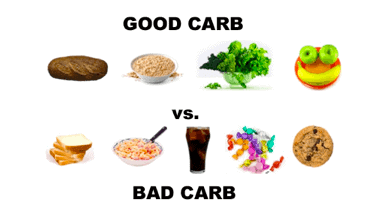
Why cutting carbs is not the solution to losing weight | Ms. Info Girl
Cutting down on carbs to build muscle will sound strange to a bodybuilder. Thanks to the traditional way of building muscle. Well, the old way works. Precisely, carbs provide glycogen that stimulates insulin and creates an anabolic response. This response then helps you build muscles.
Sadly, eating too many carbs can cause insulin resistance and hinder the burning of stored body fat for energy. That, in turn, leads to unwanted fat gain, systematic inflation, and chronic high blood sugar. So, keto diets for efficient muscle building seem like the healthiest alternative.
Seeing the significant role carbs play in building muscles, will a decrease in carb intake (as with keto diets) affect your muscle gain? Well, let’s find out.
Studies indicate that going on a keto diet alongside a food resistant training will cause favourable changes in body composition. Also, it will do that without excess weight gain.
So, to gain muscle on a keto diet, you’d have to first get into ketosis by restricting your daily carb intake. This reduction falls to around 50grams of carb daily for most people, but some; they might have to go lesser. Correctly, a range of 20 to 50 grams of carbs per day is sufficient to get you into ketosis. Still, two things are essential: patience and timing.
Even if you reduce your carb intake, it may take you weeks to get into full ketosis. Even more, at its initial stages, ketosis can reduce your performance. So, you’d have to time your carb intake to affect your workout performance adequately.
Typically, many keto dieters consume their daily allowed carbs just before their workouts to improve their performance. This approach is called the targeted keto approach, and the timing for carb consumption is usually 30 minutes to an hour before workouts.
In all, we know you’ve heard about increasing carb intake to build muscle. Although that is correct, it will not work for keto diets. You should cut down on your carbs to get into and stay in ketosis.
However, if you experience a decrease in workout performance (which is normal), you should try the targeted keto approach.
 Monitor your electrolyte consumption
Monitor your electrolyte consumption
While your body is in ketosis, you must monitor your electrolyte levels to keep your performance levels during workouts optimum. That is because being on keto alongside working out can deplete your body quickly of electrolytes.
There are three significant electrolytes to maintain for building muscles on a keto diet- sodium, magnesium, and potassium. To do that, you can opt for electrolyte drinks or refill with keto-friendly nutrient-dense foods. Mind you; you will have to check the calorie content of each electrolyte drink or food before taking them.
- Electrolyte capsules that quickly dissolve to help reduce heat stress and muscle cramping
- Replenishes what your body loses from sweat to help maintain electrolyte levels; boosts stamina
- Ideal for teens and adults, providing rehydration for running, cycling, soccer, football, weight lifiting, hiking, camping, and more
- Clean and simple ingredients; Non-GMO, Vegetarian, and Gluten Free
- Suggested use: 1 capsule per 30-60 minutes during activity, one capsule contains 215 mg sodium, 63 mg potassium, 22 mg calcium, and 11 mg magnesium
- A BETTER KIND OF SPORTS DRINK This is what sports drinks were meant to be. Our organic electrolyte drink is refreshing and majorly hydrating. And none of the junk like what’s in the neon yellow sports drinks you grew up drinking.
- LOW SUGAR FORMULA Our hydration drinks have no added sugar, only 30 calories, and a low overall carb count. We believe that your sports drink shouldn’t be the #1 source of sugar in your diet.
- SMART, EFFECTIVE HYDRATION Formulated for rapid hydration and fast absorption of critical electrolytes to help fight fatigue, muscle cramps, headaches, lack of focus, and more. With NOOMA, you feel better faster.
- ORGANIC INGREDIENTS YOU’LL LOVE We’re dedicated to using functional ingredients that are organic and plant-based. Each drink is USDA Organic, non-GMO, gluten-free, vegan, Paleo, and Keto-friendly - no artificial sweeteners, colors, flavors, or preservatives.
- REFRESHING TASTE We took years to develop our 5 deliciously refreshing flavors that aren’t too sweet and deliver on taste and hydration. With NOOMA, you get to enjoy great taste AND organic, hardworking ingredients.
Meanwhile, you can opt for electrolyte pills, electrolyte drinks, or electrolyte powder. Any would work.
- KETO, PALEO & LOW CARB FRIENDLY: replenishing electrolytes on the Keto diet can help prevent carb withdrawal symptoms (also known as the Keto flu), minimize muscle cramps and prevent dehydration.
- NO ADDITIVES: KetoLogic electrolytes deliver key nutrients without any artificial ingredients. That means no sugar, gluten-free, Non-GMO, no calories and of course no carbs!
- OPTIMAL HYDRATION: Our balanced formula of potassium, sodium, calcium & Magnesium provides the perfect balance of electrolytes and dissolves easily in hot or cold liquids.
- BOOSTS ENERGY: KetoLogic Electrolyte make for a refreshing and hydrating drink that provides An energy-boosting dose of minerals and trace minerals.
- RECOVERY: electrolytes are minerals that are important for helping your body perform at its best. Drinking electrolytes can help enhance cellular energy and endurance, while supporting muscle and nerve function.
You can also replenish potassium with keto-friendly foods like fishes: Tuna, salmon and cod, vegetables: broccoli, mushrooms, cucumber, and spinach. Magnesium-rich keto-friendly foods include almond, avocado, cashew, dark chocolate, kale, and spinach. Lastly, sodium-rich foods include; sea salt, parmesan, turkey breast, Feta cheese, and cheddar cheese.
 Strength train regularly
Strength train regularly
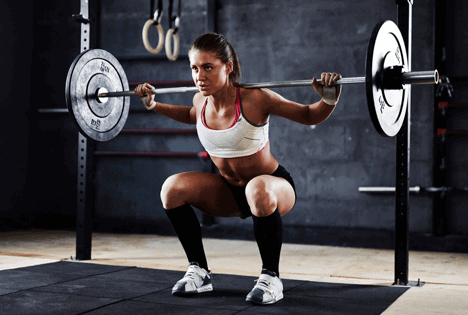
Strength training for sport: how much is too much? | Peak Performance
Well, you can’t build muscle by just eating keto diets or any other diet. To achieve your keto diet, muscle-building goals, you’d have to give resistance (strength) training as much importance as your nutrition.
When you hear strength training, you probably will be thinking about boringly lifting weights to gain and build muscles.
Well, that’s not entirely true. Strength training involves heavy compound lifts like deadlifts and bench press, but other exercises can be strength-based. More so, studies indicate that resistance exercise can be enjoyable to do, as it is a proven way to boost your mood.
So, if you are not keen on deadlifting, you can opt for other fun-filled strength training like Yoga or Pilates, rowing, bodyweight squats, sprinting, push-ups or planks. Anyone will be just fine, but the real deal is consistency.
Studies indicate that resistant training done at least twice a week is more effective in improving muscle gains than training only once per week.
 Increase your healthy fat intake
Increase your healthy fat intake
Generally, keto diets involve taking 70 to 75 per cent of your calories from fat. It also requires 20 to 25 per cent of your calories from protein and the remaining 5 per cent from carbs. That is because your body needs to generate energy from fats instead of carbs. So, going lesser than this percentage might not get you into ketosis.
For every gram of protein and carb, the calorie content is 4. However, for that of fat, one gram equals nine calories. To calculate your fat requirement, subtract protein and carb need from your daily calorie needs. Afterward, divide the result by 9. For instance, if you weigh 75kg and will require a 200-calorie muscle to gain weight, your fat intake should be 1500calories: 167grams of fat. More so, you should eat 100 grams of protein and 25grams of carbs.
Overall, to build muscle on a keto diet, you need an efficient intake of fats, protein, and carbs. However, fats should make up to 75% of your calorie intake and protein 20%.
 You can use supplements
You can use supplements

Although using supplements to complement your workout is not a must, it will go a long in helping you to build muscles. How? Glycogen is the form the human body stores glucose in muscle cells. Working out will deplete these muscle glycogen, and low-carb diets do not optimize glycogen.
So, to keep your performance optimum, you need supplements. Studies indicate that creatine monohydrate supplements can significantly increase workout performance. Precisely, creatine will help you synthesize and maintain glycogen stores but will work effectively on when your body adapts to the keto diet.
There are other benefits to using creatine supplements for workouts. These benefits include- increased explosive power, improve cognitive performance, build strength and muscle, and prevent age-related muscle loss.
An alternative supplement to consider is protein powder. Protein powder will help to meet your daily protein needs quickly. Yet, it is worth mentioning that some protein powders contain carbs; hence, you should structure your overall diet to account for it.
- ✅ Measure Ketones: Perfect Keto Test Strips are used for measuring whether you’re in ketosis based on ketones in your urine. It’s easier to use than a glucose blood meter or breath analyzer monitor.
- ✅ Reliable: Count on this doctor developed, high-quality testing kit to give you results with precision. Unlike other products, these are convenient and easy to use at home, at work, or during travel.
- ✅ Quick Results: Just pee on a strip, or in a cup and dip the strip. Tap off excess urine, then wait 40-60 seconds. Compare the dipstick’s color to our chart to determine if you’re in ketosis.
- ✅ Bulk Kit: 100 precision keto tester strips per bottle. If you test and monitor once per day, you can do urinalysis testing for 3 months plus with this one package. They’re best for women or men.
- ✅ New to Keto? Sticks are great to see your progress on getting your body into ketosis. They can also measure ketones for those on low carb diets such as Atkins
- The cap colors on bottles may vary from the product image shown due to a new cap color transition that is currently in process
- Vitamin C and Zinc Provides Immune Support along with Vitamin E
- 100% WHEY PROTEIN ISOLATE - a high-quality protein source providing 25g per serving to support muscle building and recovery
- ZERO/LOW CARB OPTIONS- helps for those watching their calorie intakes
- A PERFECT FIT - supports your active lifestyle and can be used post-workout, between meals, along with a healthy breakfast, or any time of day
In all, whether you buy a creatine supplement or get a protein powder, you sure will replenish your protein and glycogen stores alongside build muscle on your keto diet.
Keto Muscle Building Meals
Keto-baked salmon with lemon and butter
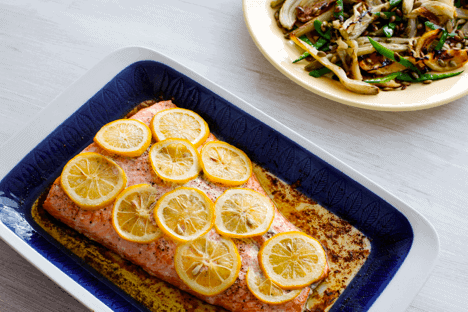
Keto Baked Salmon with Lemon Butter — Recipe — Diet Doctor
Ingredient
Prep and cook time: total 40 minutes
Servings: 6
Instruction
Steak and egg
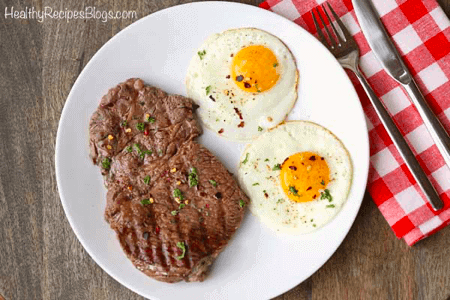
Steak and Eggs Breakfast Recipe | Healthy Recipes Blog
Ingredient
Prep and cook time: total 20 minutes
Servings: 2
Instruction
Prosciutto-wrapped Avocado egg
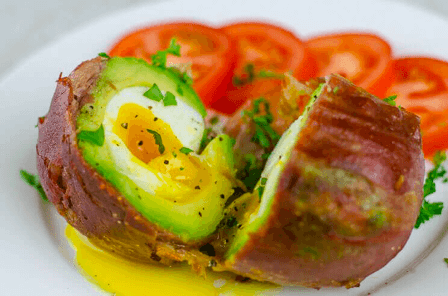
Ingredient
Prep and cook time: total 15 minutes
Servings: 2
Instruction
Wrapping up
Keto diets involve you limiting your carb intake and increasing your protein and healthy fat consumption. It is effective for weight loss. However, it is also a powerful way of building muscles like the typical high-carb diets peculiar with bodybuilders.
So, how do you build muscles on a keto diet? We are sure you can’t be asking this question now. The information provided above will help you get into ketosis, lose water, and fat-weight but also ensures you gain muscles.


